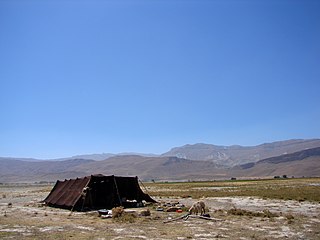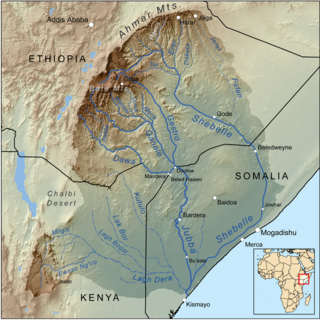Related Research Articles

A non-governmental organization (NGO) or organisation non-gouvernemental (ONG) is an organization that generally is formed independent from government. They are typically nonprofit entities, and many of them are active in humanitarianism or the social sciences; they can also include clubs and associations that provide services to their members and others. NGOs can also be lobby groups for corporations, such as the World Economic Forum. NGOs are distinguished from international and intergovernmental organizations (IOs) in that the latter are more directly involved with sovereign states and their governments.

Pastoralism is a form of animal husbandry where domesticated animals are released onto large vegetated outdoor lands (pastures) for grazing, historically by nomadic people who moved around with their herds. The animal species involved include cattle, camels, goats, yaks, llamas, reindeer, horses, and sheep.

Environmental policy is the commitment of an organization or government to the laws, regulations, and other policy mechanisms concerning environmental issues. These issues generally include air and water pollution, waste management, ecosystem management, maintenance of biodiversity, the management of natural resources, wildlife and endangered species. For example, concerning environmental policy, the implementation of an eco-energy-oriented policy at a global level to address the issues of global warming and climate changes could be addressed. Policies concerning energy or regulation of toxic substances including pesticides and many types of industrial waste are part of the topic of environmental policy. This policy can be deliberately taken to influence human activities and thereby prevent undesirable effects on the biophysical environment and natural resources, as well as to make sure that changes in the environment do not have unacceptable effects on humans.
An ENGO is a non-governmental organization (NGO) in the field of environmentalism. These organizations operate both locally and internationally which makes them play an important role in dealing with different kinds of environmental issues that are happening in the contemporary world. One of the most distinguishable things between environmental NGOs and environmental movements is that environmental NGOs have constitutions that state the rules of how power gets distributed among the people who are part of them.

The Great Green Wall or Great Green Wall of the Sahara and the Sahel is a project adopted by the African Union in 2007, initially conceived as a way to combat desertification in the Sahel region and hold back expansion of the Sahara desert, by planting a wall of trees stretching across the entire Sahel from Djibouti, Djibouti to Dakar, Senegal. The original dimensions of the "wall" were to be 15 km wide and 7,775 km long, but the program expanded to encompass nations in both northern and western Africa. The concept evolved into promoting water harvesting techniques, greenery protection and improving indigenous land use techniques, aimed at creating a mosaic of green and productive landscapes across North Africa. Later it adopted the view that desert boundaries change based on rainfall variations.

Farmer-managed natural regeneration (FMNR) is a low-cost, sustainable land restoration technique used to combat poverty and hunger amongst poor subsistence farmers in developing countries by increasing food and timber production, and resilience to climate extremes. It involves the systematic regeneration and management of trees and shrubs from tree stumps, roots and seeds. FMNR was developed by the Australian agricultural economist Tony Rinaudo in the 1980s in West Africa. The background and development are described in Rinaudo's book The Forest Underground.
Watershed management is the study of the relevant characteristics of a watershed aimed at the sustainable distribution of its resources and the process of creating and implementing plans, programs and projects to sustain and enhance watershed functions that affect the plant, animal, and human communities within the watershed boundary. Features of a watershed that agencies seek to manage to include water supply, water quality, drainage, stormwater runoff, water rights and the overall planning and utilization of watersheds. Landowners, land use agencies, stormwater management experts, environmental specialists, water use surveyors and communities all play an integral part in watershed management.

Access to water supply and sanitation in Ethiopia is amongst the lowest in Sub-Saharan Africa and the entire world. While access has increased substantially with funding from foreign aid, much still remains to be done. Some factors inhibiting the achievement of these goals are the limited capacity of water bureaus in the country's nine regions, two city administrations and water desks in the 770 districts of Ethiopia (woredas); insufficient cost recovery for proper operation and maintenance; and different policies and procedures used by various donors, notwithstanding the Paris Declaration on Aid Effectiveness.
The Bremen Overseas Research and Development Association (BORDA) is a non-profit international development organization headquartered in Bremen, Germany, and regional offices in Afghanistan, India, Indonesia, Mexico, and Tanzania as well as several project offices within each region. BORDA began its work in 1977, starting with its first project, “Technology Transfer of Biogas India-Ethiopia.” Since then it has been active in the delivery of basic needs services across the developing world.
SONNE-International is a development aid organization that initiates, operates and / or supports educational programs as well as health care and rural development projects in Africa and Asia. The main focus is on education and training for disadvantaged children and adolescents.

Deforestation in Ethiopia is due to locals clearing forests for their personal needs, such as for fuel, hunting, agriculture, and sometimes religious reasons. The main causes of deforestation in Ethiopia are shifting agriculture, livestock production and fuel in drier areas. Deforestation is the process of removing the forest ecosystem by cutting the trees and changing the shape of the land to suit different uses.
Promoting Local innovation in ecologically oriented agriculture and NRM, known as PROLINNOVA, is an NGO-initiated international learning network to promote local innovation in ecologically oriented agriculture and Natural resource management. It is a "Global Partnership Programme" under the umbrella of the Global Forum on Agricultural Research (GFAR). The focus of PROLINNOVA is on recognising the dynamics of indigenous knowledge and enhancing capacities of farmers to adjust to change – to develop their own site-appropriate systems and institutions of resource management so as to gain food security, sustain their livelihoods and safeguard the environment. The essence of sustainability lies in the capacity to adapt.

The Dawaro River is found in East Africa, covering an area of, 58,961 km2. It flows through three major countries: Kenya, Ethiopia, and Somalia, with 81% falling into Ethiopian territory. It is known for its complex geological environment, evident through its diverse lithology and structural framework, coming from the river's closeness to multiple volcanic-tectonic events. The wide river has gentle slopes either side of its exposed bedrock. The Dawa river flows south east to form part of the Ethiopia - Somalia border and part of Ethiopia - Kenya border. Awata, Digati, and Mormora are the only significant off-flowing rivers to Dawa.
The Development Fund (Utviklingsfondet) is a Norwegian non-governmental organization (NGO) founded in 1978 by Norwegian author, Erik Dammann.
The GLOBAL ENVIRONMENTAL INSTITUTE (GEI) was founded in the U.S. in 2003 and was registered as an independent non-profit organization in the State of Delaware. GEI's mission was to design and implement market-based models for solving environmental problems in order to achieve development that is economically, ecologically, and socially sustainable. GEI was dissolved in October 2011. GEI's sister organization, the independent Beijing Chaoyang District Sustainable Global Environmental Institute in China (GEI-China) remains active.
Community-based management (CBM) is a bottom up approach of organization which can be facilitated by an upper government or NGO structure but it aims for local stakeholder participation in the planning, research, development, management and policy making for a community as a whole. The decentralization of managing tactics enables local people to deal with the unique social, political and ecological problems their community might face and find solutions ideal to their situation. Overwhelming national or local economic, political and social pressures can affect the efficiency of CBM as well as its long term application. CBM varies across spatial and temporal scales to reflect the ever-changing distinctive physical and/or human environment it is acting within. While the specifics of each practice might differ, existing research maintains that community based management, when implemented properly, is incredibly beneficial not only for the health of the environment, but also for the well-being of the stakeholders.
Students Offering Support (SOS) is a multi-national charitable and entrepreneurial initiative that currently supports and develops individual SOS chapters within post-secondary institutions across North America. This organization's business model – uniquely designed "by students for students" – raises funds to build schools in Latin America through their Exam-AID review sessions, which are held prior to an exam and taught, as well as coordinated, by student volunteers.
The R20 – Regions of Climate Action is a non-profit environmental organization founded in September 2011, by former governor of California, Arnold Schwarzenegger, with the support of the United Nations. R20 is a coalition of sub-national governments, private companies, international organizations, NGOs, and academic & financial institutions. Its mission is to accelerate sub-national infrastructure investments in the green economy to meaningfully contribute to the Sustainable Development Goals (SDGs). The NGO operates at the sub-national level as R20 believes sub-national governments constitute a powerful force for change and are best positioned to take action & implement green projects.

Climate change education (CCE) is education that aims to address and develop effective responses to climate change. It helps learners understand the causes and consequences of climate change, prepares them to live with the impacts of climate change and empowers learners to take appropriate actions to adopt more sustainable lifestyles. Climate change and climate change education are global challenges that can be anchored in the curriculum in order to provide local learning and widen up mindset shits on how climate change can be mitigated. In such as case CCE is more than climate change literacy but understanding ways of dealing with climate

The Pastoral and Environmental Network in the Horn of Africa (PENHA) is an international non-governmental organisation, founded in 1989 by professionals and development workers from the Horn of Africa to address pastoral and agro-pastoral development from a regional perspective and provide cross-learning at a global level. With headquarters in London, PENHA has established country offices in Ethiopia and Somaliland, with close organisational partnerships in Eritrea, Sudan and Uganda.